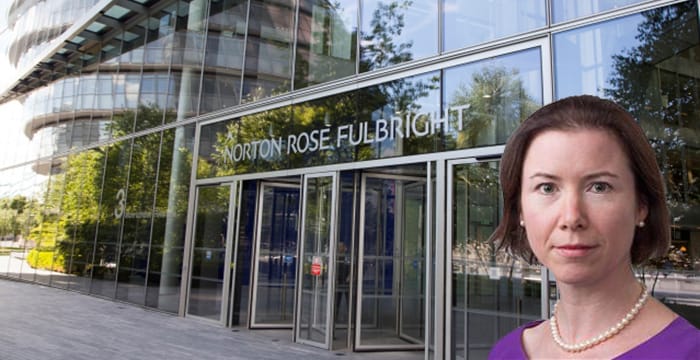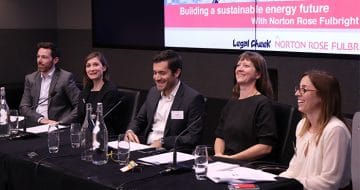Claire O’Donnell, graduate recruitment partner at Norton Rose Fulbright, shares her top tips to writing vac scheme applications ahead of the firm’s 31 January deadline

When applying for a vacation scheme, you will improve your chances considerably if you can demonstrate why you are interested in a particular firm.
Claire O’Donnell, graduate recruitment partner at Norton Rose Fulbright, suggests: “Try to show a good reason why you want to work for us — preferably not something that’s a repetition of the first few pages of the firm’s website!” If that sounds difficult, then O’Donnell has the following advice: “You can reverse engineer it — what are you interested in? For example, if its tech then research the tech aspects of the firm’s work and talk about that, if its human rights, look at the commercial applications there. Above all, don’t pretend to have an interest in something if you don’t.”
As well as co-leading on graduate recruitment (with banking partner Dan Metcalfe), O’Donnell is a corporate partner, specialising in mergers and acquisitions (M&A). She found her specialism early on in her career, and has worked for the firm in this practice area as a junior and senior associate, Of Counsel and now as a partner.
“I really like working on deals,” she says. “Every deal is different, and I like the variety. I love getting to know the clients and getting to know their business. I love the problem solving aspect of it, I like negotiating documents and explaining things to clients, and I get a real buzz when the deal is signed — if there ever comes a time when I don’t then I’ll know it’s time to stop.” Working on deals can be an intense experience at times: O’Donnell says there’s definitely “a feast and famine aspect to M&A work”.
Perks of O’Donnell’s job include the strong relationships she has built up with clients (a range of multinational entities, particularly in the consumer and real estate sectors). For example, O’Donnell did her first deal as a trainee with a major global automotive company and now works with them as a partner, having got to know the team, how they operate and what’s important to them on a commercial level, very well over the years.
Corporate law wasn’t always on the agenda, however. After history at Cambridge University, O’Donnell worked in Armenia for a human rights NGO, on an EU-funded programme to enable local NGOs to apply for grants. She then worked in the UK for Interights, an NGO which conducted strategic litigation around the world to improve human rights protections, targeting violations such as torture, unlawful detention, discrimination, harassment and slavery. Sadly, Interights closed in 2014.
“I didn’t want to go and work in the City, I was quite chippy about it,” says O’Donnell. She thought they were all Gordon Gekko types. “Then I did the two-week vacation scheme here and I had to eat my words because I really enjoyed the work and liked the people. I loved the fact the trainees were really supportive of each other and even the senior partners were interested in the work we were doing, so I was really chuffed when I was offered a training contract”, she explains.
Which shows that vacation schemes really can change your life.
O’Donnell was funded through her law conversion course and Legal Practice Course (LPC) and joined the firm as a trainee. Fast forward several years and multiple deals, what advice does she have for the current cohort of law students? The following is a selection:
Do an overseas seat if you can. “I was in Moscow for six months of my training contract, which was brilliant. It’s a great experience and a chance to meet people you wouldn’t otherwise meet”, says O’Donnell.
Don’t box yourself in on practice area. “I knew quite early on that corporate law was my thing, but I always advise trainees to keep an open mind”, she explains. “They may not know they like an area until they experience it. Their future specialism may not even be known about yet. Fintech is huge now but it didn’t exist when I did my training. So, see what happens and keep an open mind.”
Look up from your desk. “Think about the broader picture. Look at those around you, for example, your trainee supervisor and think about how they are bringing in work to the firm. Make an effort to meet people — I am still working with some of the contacts I made as a trainee.”
Work out what’s important. “Try to understand how what you’re doing fits in with the firm as a whole and get to know what’s important to clients commercially. It’s a good strategy to work out what interests you, particularly, about your work.”
Say yes to opportunities, O’Donnell says. “If you are offered a chance to take part in a business development or client-facing initiative then say ‘yes’ because these are quite often amazing opportunities to develop a good relationship with clients. The same goes for pro bono and CSR activities. The trainee I am working with at the moment is very much involved in pro bono and goes to Croydon Law Centre on Tuesday evenings. It builds up her skills, dealing with real life problems, and it’s not only good for her experience, it’s the right thing to do.”
And finally, for those far-sighted students already eyeing up their chances of partnership, O’Donnell says:
“When looking at the careers of most senior people at firms today, it’s important to be aware that people made partner far more quickly 10 or 20 years ago than they do today. Remember that it’s a marathon not a sprint.”
About Legal Cheek Careers posts.


